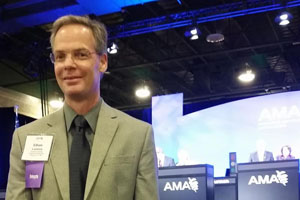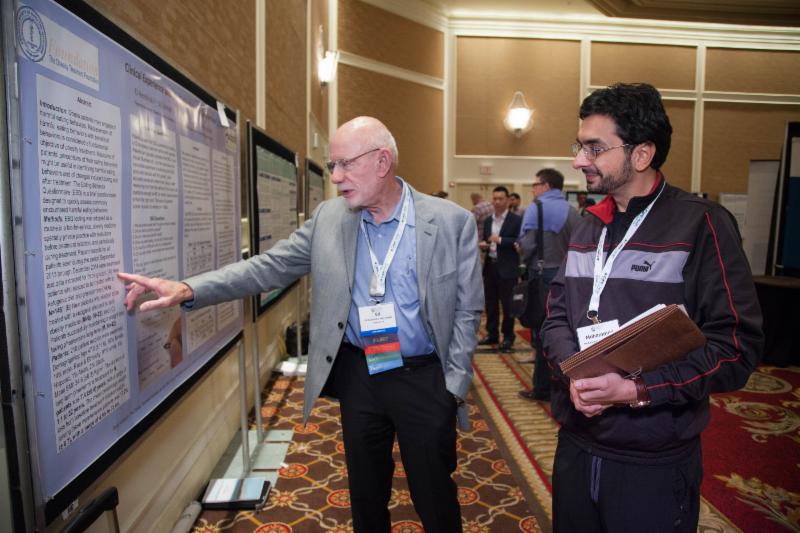 OMA hosts second obesity caucus at AMA interim meeting
Special report by Dr. Ethan Lazarus, secretary/treasurer of OMAThe American Medical Association (AMA) held its interim meeting in Atlanta on Nov. 14-17. Thank you, Dr. Carl Knopke, for stepping in as the alternate delegate and joining me in representing OMA at this important meeting. The interim meeting is devoted to the AMA's advocacy efforts. To this end, I hosted the second meeting of the newly formed obesity caucus and met with multiple other state and specialty societies that share the interest of treatment parity for individuals affected by obesity. We continued to plan strategies that the AMA can employ to improve obesity prevention, access, and treatment, including both educational and advocacy approaches. The House of Delegates (HOD) deliberated over and passed many items of interest, including resolutions to: - Work towards EHR interoperability and lobby to remove penalties for failure to achieve meaningful use due to lack of interoperability or decertified EHRs.
- Support access to preventive and reproductive services for all patients and oppose legislative proposals that would deny established and accepted medical care to any segment of the population.
- Support a ban on direct-to-consumer advertising for prescription drugs and implantable medical devices.
- Improve coverage for treatment of lymphedema.
- Campaign to improve national vaccination rates.
- Encourage FTC actions to limit anticompetitive behavior by pharmaceutical companies attempting to reduce competition from generic manufacturers.
I'd like to thank OMA for allowing me this opportunity to serve as their AMA delegate. |
 |
 Back by popular demand: Review Course now offered at both spring and fall conferences
The American Board of Obesity Medicine (ABOM) had a record-breaking number of applications this year for the obesity medicine certification exam. Our review course is the preferred course for exam preparation, as indicated by the overwhelming number of registrants for the course last fall. With that in mind, we decided to offer the review course twice next year! You can take the Review Course for the ABOM Exam in the spring in San Francisco or in the fall in Chicago (or both). Our Review Course is among the top-rated resources for exam preparation. See what others who've attended had to say about the course:
- "Very helpful and full of high-level information. I feel confident about what I learned."
- "[It] did an outstanding job targeting the material covered [for] exam preparation."
- "The program was outstanding! I gained a tremendous amount of updated information."
- "The majority of speakers were sensational and knowledgeable."
Ready to start preparing for the ABOM exam? Register online for the Review Course. |

New resource for obesity medicine clinicians
This spring, the marketing-communication committee took on the task of creating a resource that could help us spread the word about obesity medicine. The final product is a series of videos that explain what the disease of obesity is and how obesity medicine clinicians treat obesity differently. You may recognize some of your obesity medicine colleagues starring in:
These videos are a new resource to help you market yourself as an obesity medicine clinician, both to patients and to providers who could refer their patients with obesity to you. Feel free to share the videos on your websites and on social media!
|
 Members of OMA are now members of World Obesity
As a member of OMA, you are now receiving a new benefit of membership -- a complimentary membership in the World Obesity Federation. World Obesity is a global community of more than 50 organizations dedicated to solving the problems of obesity. You can log in to your new World Obesity member account to begin using the benefits of World Obesity membership, which include discounted subscription rates to four official journals, discounted SCOPE online learning courses, access to policies and statistics on the data portal, and more! See a full list of World Obesity member benefits. |
 |
 See the abstracts for the posters displayed at Overcoming Obesity 2015
Refresh your memory about the research presented during the poster session at Overcoming Obesity 2015. The abstracts for the posters that were on display at the fall conference are now available online. The abstract titled "Do decreases in visceral adipose tissue correlate with physiologic or metabolic improvements in children with severe obesity?" by Dr. Suzanne Cuda was the winner of the Obesity Treatment Foundation's annual poster contest. See all of the abstracts from Overcoming Obesity 2015. |
 |
Challenging obesity: Patient, provider, and expert perspectives on the roles of available and emerging nonsurgical therapies
Apovian, C. M., Garvey, M. T., and Ryan, D. H. Obesity, 2015.
This supplement article reviews approaches to comprehensive, non-surgical obesity treatment. The authors emphasize that lifestyle management (nutrition, physical activity, and behavior modification) is the core intervention for obesity treatment, and pharmacotherapy and bariatric surgery are recommended as additional therapies. This article reviews current anti-obesity medications and also medication options to minimize the negative impact on weight in the treatment of a number of co-existing conditions. Various treatment guidelines were also discussed. The article also provides two case examples and expert clinical perspectives for approaching the cases. Overall, health care professionals are encouraged to employ an array of interventions to help patients face the physiological and behavioral challenges of weight loss. View article
|
|
|
*These events are hosted by organizations other than OMA. Contact the organization directly for details.
|
|
Answered by Dr. Joan Temmerman
Q: How do you address cravings on a VLCD? Are sugar-free gum and diet soda allowed on a VLCD? What is your approach if a patient on a VLCD comes back and says "I'm hungry. What do I do?"
A: Food becomes unimportant (stimulus narrowing) across the board, so I do not commonly see cravings. I allow diet soda. Sugar-free gum and mints are OK as long as they do not have extra carbohydrates. Hunger is unusual because the protein level is high. If a patient is hungry, I ask how long it has been since they had a meal replacement. If it is more than three hours, they need to adjust their routine. They should be having a meal replacement every three hours or so. If there is a period of hunger regularly and they are getting in all their meal replacements, I add a protein snack (egg, low-fat cheese stick, or two-ounce meat/poultry stick).
|
 |
|
Executive Director
Sponsorships and Exhibits Manager
Operations Manager
Education Coordinator
Communication Manager
Executive Director of the Obesity Treatment Foundation
|
|
101 University Blvd.,
Suite 330
Denver, CO 80206
|
|
 |
|
Metabolic syndrome and obesity among users of second-generation antipsychotics: A global challenge for modern psychopharmacology
Rojo, L. E., et al. Pharmacol Res, 2015.
Many physicians prescribe second-generation antipsychotics (SGAs), such as clozapine, olanzapine, risperidone, and quetiapine, to treat symptoms of schizophrenia (SZ) spectrum disorders. Patients who take SGAs have a high risk of weight gain, insulin resistance, and dyslipidemia. Although SZ affects a small percentage of the population, during the past ten years there has been an exponential increase in the number of SGA users, including millions of non-SZ patients. This review article discusses the clinical and molecular evidence of changes in metabolic risk from taking SGAs. View article
|
Exenatide in obesity with accelerated gastric emptying: A randomized, pharmacodynamics study
Acosta, A., et al. Physiological Reports, 2015.
Exenatide, a slow-acting GLP-1 receptor agonist, may be useful in slowing gastric emptying for patients with obesity. A randomized, controlled trial was conducted to compare the effects of exenatide and placebo in adult patients with obesity and accelerated gastric emptying. Exenatide (5ug) or placebo was taken twice daily for 30 days. The study found that exenatide delayed gastric emptying of solid foods for 86 minutes compared to placebo and decreased calorie intake by 129 kilocalories in a buffet test meal. There was also a 0.95 kilogram (kg) weight loss, which was not significantly different from the placebo group, which lost 0.55 kg. Overall, exenatide may be helpful in delaying gastric emptying and lowering food intake as a way to help combat obesity. View article
|
 |
 Obesity Medicine 2016
This spring we're headed to San Francisco for Obesity Medicine 2016, your leading resource for certification exam review and the premiere source of education about managing an obesity medicine clinic, nutrition, and the comprehensive approach to obesity treatment. Build your schedule* to include the courses that most interest you, and earn up to 30 CME/CE. |
Review Course for the ABOM Exam
13 CME/CE | April 6-7
Helps prepare those planning to take the American Board of Obesity Medicine (ABOM) certification exam.
| Practice Management Essentials
6.5 CME/CE | April 6
Explains the best business practices for running an obesity medicine clinic, from setting up a practice to boosting patient retention.
|
|
Nutrition Course
6.5 CME/CE | April 7
Outlines the latest evidence-based findings about nutrition and helps you select appropriate nutrition plans for your patients.
| Spring Obesity Summit
17 CME/CE | April 8-10
Addresses topics related to current and emerging research, evidence-based treatment approaches, technologies, and practical methods used by obesity medicine clinicians.
|
|
|
*The Review Course for the ABOM Exam runs concurrently with Practice Management Essentials on Wednesday and the Nutrition Course on Thursday. Registration for the Review Course includes two days of class time, and switching among courses is not allowed.
|
 Obesity Medicine Basics
This one-day course provides introductory-level training about the evaluation and treatment of patients affected by obesity. Refer a colleague to a course in their area and allow us to introduce them to obesity medicine. Learn more about this course. Course dates and cities:- Jan. 16 | Indianapolis
- Jan. 23 | New Orleans
- Jan. 30 | Philadelphia
- Feb. 20 | Raleigh
- Feb. 27 | San Diego
- July 16 | Houston
- July 30 | Minneapolis
- Aug. 13 | Orlando
|
|
|
|
The Obesity Medicine Association and the Obesity Treatment Foundation thank our 2015 Corporate Advisory Council members for their continuous support.
|
© 2015 Obesity Medicine Association. All rights reserved. Materials may not be reproduced, redistributed or translated without written permission. Advertising disclaimer: Under a policy approved by the OMA executive committee and exhibitor/advertiser review committee, commercial companies may apply to advertise in OMA publications. Approval does not imply endorsement or official recognition of particular products or services.
|
|
|
|